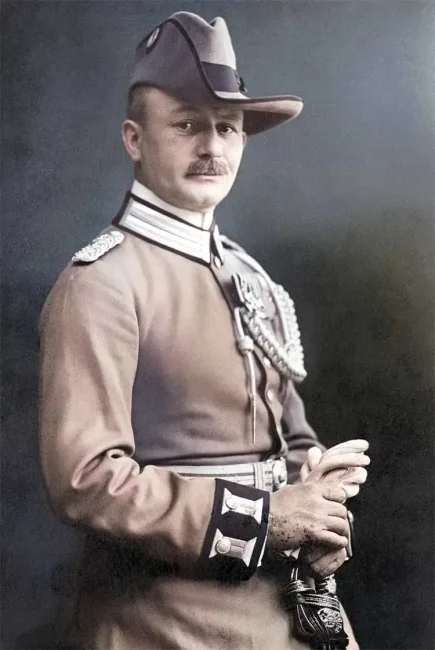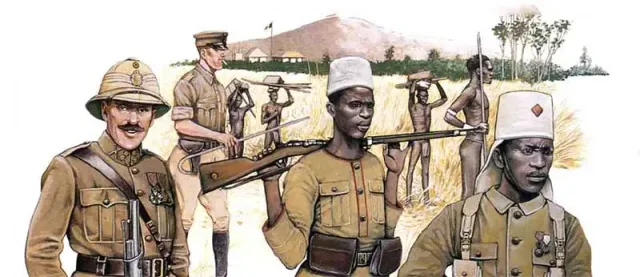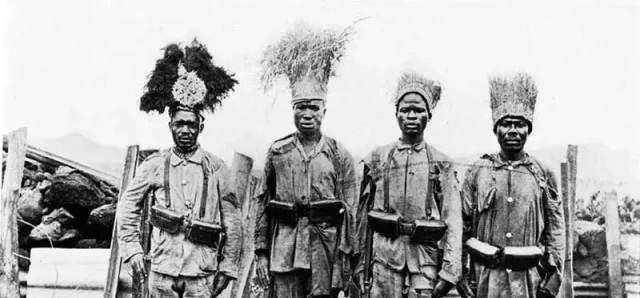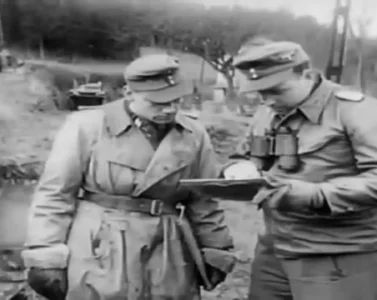- Military History
- Biographies
- Militarians Biographies
- Paul Emil von Lettow-Vorbeck
Paul Emil von Lettow-Vorbeck
German general and guerrilla in Africa during World War I and popularly known as the Lion of Africa
Born in Saarlouis, Lettow-Vorbeck was the son of a prominent Prussian army officer. Marked from birth for a military career, Lettow-Vorbeck was commissioned as an artillery officer and graduated from the prestigious Kriegsakademie (war academy) in 1899. His promise was early apparent, and he was tapped for service on the General Staff (1899-1900).
In 1900, Lettow-Vorbeck was dispatched to China with the German expeditionary force as part of an international coalition to punish the so-called Boxers, Chinese nationalists who rebelled against European interests in their country. Following the conclusion of the Boxer Rebellion in 1901, Lettow-Vorbeck served in German Southwest Africa (present-day Namibia), fighting the Hottentots and Hereros during 1904-08. This proved an extraordinarily arduous undertaking for a commander trained in the arts of European wars. Lettow-Vorbeck was wounded in an ambush in 1906 and sent to a hospital in South Africa.
Upon his return to Germany, he was promoted to lieutenant colonel and, early in 1914, was sent back lo Africa as commander of forces in German East Africa (present-day Tanzania). His native troops-askaris-were armed with obsolete weapons and, as Lettow-Vorbeck knew, would be cut off once a world war begun. With limited supplies and very limited human resources, he resolved to strike preemptively. As soon as World War I began in August I 914, he staged raids against the British railway in Kenya and then attempted to capture Mombasa. In this effort, he was driven back by September but successfully defended against a British amphibious attack on the port town of Tanga in north eastern Tanzania during November 2-3, 1914. He made the attack costly for the British, not only inflicting heavy losses, but gaining a large cache of badly needed arms and ammunition.
Lettow-Vorbeck continued to strike at the British, who were themselves poorly supplied and ordered to maintain n defensive posture only. When the Royal Navy sank the German cruiser Königsberg in the Rufiji River, the ship on which Lettow-Vorbeck depended heavily for support, he set about salvaging most of her guns, and he commandeered the vessel's crew as soldiers.
In March 1916, Lettow-Vorbeck finally faced a formidable offensive led by South African general Jan Christiaan Smuts. With brilliant patience, Lettow-Vorbeck made the climate and terrain his ally, fighting nothing more than delaying actions to wear down the British troops. In the end, tropical diseases did far more than his men's bullets. As British numbers increased, Lettow-Vorbeck gradually conceded to invasion, exacting from the invaders what price he could.
He turned on his pursuers and lashed back, frequently surprising the British. At Mahiwa, during October 15-18, 1917, he cost the British forces, which outnumbered his own four to one over 1,500 casualties while incurring himself a mere 100.
It was clear that Lettow-Vorbeck that the British would ultimately drive him out of German East Africa. He therefore invaded the Portuguese colony of Mozambique in December and supplied his 4,000 man army by raiding Portuguese garrisons. He raided as far south as Quelimane on the coast during July 1-3, 1918, then turned north again and reentered German East Africa during September-October After this, he launched an invasion of British-held Rhodesia (present-day Zimbabwe) and took the principal city of Kasama (modern Zambia) on November 13 - two days alter the Armistice.
Isolated from the rest of the world, Lettow-Vorbeck heard only vague rumors of the German surrender, but these prompted him to open negotiations with the British. He surrendered his undefeated army to the British at Abercorn (Mbala, Zambia) on November 23.
Following the end of World War I, Lettow-Vorbeck remained in Africa to arrange for the repatriation of German soldiers and POW. When he returned home in January 1919, it was to a hero's welcome and a promotion to general major.
Back in Germany, he was pleased to hear from English sources that altogether during the four years of war in East Africa, 137 generals had served there with 300,000 troops, who had suffered 60,000 casualties. It is difficult to verify these figures, though the maps from that period illustrate the large number of British and Belgian troops which were pursuing him all over East Africa. Lettow-Vorbeck brilliantly achieved his aim to occupy as many enemy troops as possible, to prevent them being used elsewhere against the German army. In fact, although some Indian troops fought on the Western Front, most of the units used against him in East Africa would not actually have been deployed in the European theater. The Gold Coast Regiment, The Nigerian Regiment, and the King's African Rifles were not likely to have taken part in the fighting on the Western Front.
Enormously popular, he became a right-wing extremist who organized the occupation of Hamburg by a force of rightist volunteers and the Freikorps, ousting left-wing Spartacists from the city in July. Arrested and briefly jailed for this action, he gained election to the Reichstag, serving from May 1929 to July 1930. Although a rightist, he contested the Nazis, but finding that opposing them to be a lost cause, he retired from politics and from public life.
By the end of the Second World War, Lettow-Vorbeck was poor. His house in Bremen had been destroyed by Allied bombs, and he depended for a time on food packages from his friends. After the postwar economic boom, however, he enjoyed comfortable circumstances again. In 1953 he visited Dar-es-Salaam, where he was welcomed by surviving Askaris who greeted him with their old marching song Heia Safari! (in the below audio section) British colonial officials welcomed him with full military honours.
He lived out the rest of his long life quietly in Hamburg.
As a German officer, Lettow-Vorbeck was among the least likely candidate, for greatness as a guerilla leader, hut he had a natural talent for resourcefulness and making the most of very limited resources. He won the respect and loyalty of European and native troops alike.
Lettow-Vorbeck lived to a great and honored old age, dying in Hamburg on 9 March 1964 at ninety-three.
Paul Emil von Lettow-Vorbeck - Quick Facts
- German Empire (1866-1918)
- Germany - Weimar Republic (1919-33)
- Germany Nazi (1933-1945)
- Imperial German Army (1871-1919)
- Prussian Army (1701-1919)
- Reichsheer (Reich Army Germany 1919-1935)
- Schutztruppe (1891-1918)
- Boxer Rebellion (1899-1901)
- Herero Wars (1904-1908)
- WWI (1914-1918)
- German Revolution (1918-1919)
- Weimar Republic (1918-1933)
Audio
- {{#owner}}
- {{#url}} {{#avatarSrc}}
{{name}} {{/url}} {{^url}} {{#avatar}} {{& avatar}} {{/avatar}} {{name}} {{/url}} - {{/owner}} {{#created}}
- {{created}} {{/created}}



























